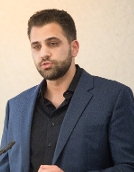The German Department offers courses in German language, history, literature and culture.Our courses teach students critical thinking, help them navigate questions of cultural exchange, and contextualize the German speaking world in a European and global context. The ability to speak German and demonstrate a competency in the cultures of Austria, Germany and Switzerland, will benefit those students seeking career opportunities in international and governmental organizations, politics, engineering, bio-medical research, economics, fashion and art. Germany is geographically located in the heart of Europe and is a major economic and political player in the European Union, and a world leader in industries such as engineering, chemical and medical research, and green technologies. Given that German is spoken by over 100 million people, and is the third largest exporter and importer in the world, a German major or minor can open many exciting career paths.

Anke Biendarra
abiendar@uci.edu
View Faculty Profile
Associate Professor and Chair of European Languages and Studies; German Core Faculty
Interests: German and European literature and culture of the 20th/21st century, esp. pop literature, GDR/reunification. Critical European Culture Studies, migration studies, transnationalism, memory studies, gender studies.

Philip Broadbent
pmb@uci.edu
View Faculty Profile
Assistant Professor of Teaching of European Languages and Studies; Director of the German Language Program
Interests: Contemporary literature and history; politics and the urban space; German language learning

Kai Evers
kevers@uci.edu
View Faculty Profile
Associate Professor of European Languages and Studies, German Core Faculty; Director of European Studies
Interests: Modernist literature, German film, European studies, Catastrophic Imagination and Representations of War, Violence, and Risk

David Pan
dtpan@uci.edu
View Faculty Profile
Professor of European Languages and Studies; German Core Faculty, Director of German Studies; Director of Graduate Studies (M.A. in European Thought and Culture)
Interests: Eighteenth-, Nineteenth-, and Twentieth-century German Literature and Intellectual history, Johann Georg Hamann, Heinrich von Kleist, Johann Wolfgang von Goethe, Bertolt Brecht, Frankfurt School Critical Theory, Carl Schmitt

Mohammad Rafi
mrafi@uci.edu
View Faculty Profile
Lecturer in German
Interests: Nationalism, Philosophy; German language learning

